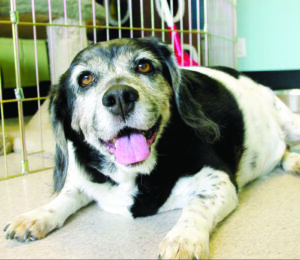By Dr. Beth Leermakers
Most of the DFW animal shelters are full now, with strays and owner surrenders coming in daily by droves. If you’ve been thinking about adopting a dog (or cat), this is a great time to save a life. A successful adoption requires more than just going to the shelter and picking a beautiful dog that catches your eye.

Photos courtesy of blogTO.com
Here are a few important considerations before you bring home a new dog:
Answer these questions:
Can you afford a dog? According to the ASPCA, the first-year cost of owning a dog exceeds $1,000, including the adoption fee (or spay/neuter surgery if you buy a puppy from a breeder), start-up supplies (e.g., food, bowls, collar, leash, harness), initial vet visit/vaccinations and a microchip (if not included in the adoption fee). After the first year, the annual expenses are about $1400 per year, including food, pet insurance, annual vet exams/vaccinations, heartworm and flea preventatives, toys and treats, and boarding (at $25/day — that’s the low end in Dallas). The ASPCA didn’t include the cost of grooming (about $40 for a small dog and $75 for a large dog) or paying a pet deposit or monthly pet fee (for renters).
Does your apartment complex or Homeowners Association (HOA) have breed or size restrictions? Many apartment complexes don’t allow “aggressive” breeds or dogs over a certain weight. Check your lease agreement or talk to your landlord before you bring home a dog. No, you won’t be able to “hide” a 75 pound dog in your apartment.
Do you have enough time to care for a dog? Most dogs require daily walks/exercise time, and they want your attention. If you travel frequently or work long hours away from home, this is probably not the best time to adopt. Consider temporary fostering when your schedule permits.
Are you ready to make a five- 15-year commitment? Nothing is sadder than seeing a 10-year-old dog dropped off at the shelter by his owner because he’s “too old,” and his “family” wants to make room for a new puppy. Dogs deserve to be part of your family. If you don’t want to make a 10 year commitment, consider adopting a senior dog, or foster a dog instead.
Is the timing right? Are you planning any major life changes in the near future? If you’re moving to a studio apartment in New York City in six months, a 70 lb. German Short-haired Pointer (a high energy breed) probably won’t be the best match. If you’re going to college next year, can you take your dog with you? If not, your parents may not be willing to care for your pup during the school year. Are you retiring next year and living out of an RV? You get the idea.
Research the breeds you’re considering. How much exercise do they need? Working breeds usually need a “job” and plenty of mental/physical stimulation or they’ll get bored and destructive. Jack Russell Terriers are usually high energy pups that don’t do well in apartments, despite their small size. How often do they need to be groomed? That adorable fluffy little dog may need to be groomed every two weeks to keep her coat from getting matted.
Herding dogs are likely to nip at your heels — a problem if you don’t want your dog rounding up your young children. Retrievers may be “mouthy.” Some breeds are more challenging than others and may not be the best choice for a first time pet parent.

Photo courtesy of the ASPCA
Where to Adopt
Visit petfinder.org to search for adoptable pets by location, breed and other parameters.
Rescue group. Although rescue group adoption fees (about $150-$350) are usually higher than shelter fees (because rescue groups have to cover the cost of spay/neuter surgery, vaccinations and other vet care), you will know a lot more about the dog you’re bringing home. If you have young children, cats and/or other dogs at home, I highly recommend adopting from a rescue group. You’ll receive lots of information from the foster parent, including (in many cases) whether the pup is suitable for kids, cats and/or other dogs.
Most rescue groups offer a home trial (usually 5-10 days) so you can be sure the dog is a good match before you finalize the adoption. You don’t have to feel guilty about returning a dog that isn’t the right fit to a full shelter. Many foster parents provide support during the home trial and after you adopt.
I give first-time pet parents detailed instructions about caring for my foster dog (e.g., what and how much to feed him, where to get the best deal on a crate). One of my adopters contacted me (one year later) when they were adopting another dog and wanted advice for introducing the pups.
If your situation changes (e.g., you get transferred overseas and truly can’t take your dog with you), make sure the dog goes back to the rescue group — not to a shelter where he faces an uncertain fate (owner surrenders are the first to be euthanized when the shelter runs out of space). When you adopt from a rescue group, you are saving a life. Rescue groups pull dogs from shelters. When you adopt from a rescue group, the foster parent has room to save another shelter dog.
Shelter. Although you won’t know as much about a shelter dog’s compatibility with cats/dogs/kids (unless the previous owner provided accurate information), there’s a good workaround: foster to adopt. Dallas Animal Services and Fort Worth Animal Care and Control have a shelter-based foster program. If the dog is a good fit, you can adopt him. If not, you can foster him until you find him a good home or return him to the shelter and try another dog.
Your new dog will need at least a few weeks to settle in and feel comfortable — whether you adopt from a shelter or rescue group.
Keep an open mind. Try not to be locked into a specific breed/sex/color. My neighbor — who only adopts blonde, female, fluffy dogs — sometimes winds up with dogs that aren’t the best match. Her last dog was reactive to cats and dogs, making their daily walks challenging. If your apartment or HOA has breed or size restrictions, of course you need to choose a dog accordingly. Ditto if you can only handle a small or medium dog. Otherwise, please choose a dog based on temperament — not appearance.
Thank you for considering adopting a dog!
